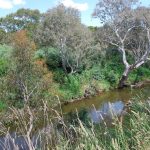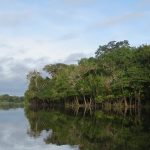 August 4, 2018 7:20 am
Published by Climate Extremes
August 4, 2018 7:20 am
Published by Climate Extremes
Research has now begun in earnest in the Drought Research Program with all key staff finally in place. This has proved timely. At the time of writing (August 2018) most of NSW has been drought declared and forecasters suggesting little sign of drought-breaking rains over coming months.
 July 30, 2018 4:57 am
Published by Climate Extremes
July 30, 2018 4:57 am
Published by Climate Extremes
A new study by CLEX researchers using observations from FLUXNET sites identifies regions of high and low predictability and will likely help improve land surface model evaluation.
 July 16, 2018 6:44 am
Published by Climate Extremes
July 16, 2018 6:44 am
Published by Climate Extremes
New research clearly demonstrates the potential to predict long-term LAI using simple ecohydrological theory. This approach could potentially be incorporated into existing terrestrial biosphere models and help improve predictions of LAI.
 July 11, 2018 11:53 pm
Published by Climate Extremes
July 11, 2018 11:53 pm
Published by Climate Extremes
This research suggests some trees and in particular, Australian trees, may be more resilient than expected to future warming and extreme events. These findings have implications for planning around which species to plant in “green cities” to help mitigate future climate extremes.
 July 6, 2018 3:43 am
Published by Climate Extremes
July 6, 2018 3:43 am
Published by Climate Extremes
The application of a simple carbon balance model, combined with a data assimilation approach, has the potential to improve the process understanding embedded in models, which is used to predict responses of the carbon cycle to climate change.
 June 12, 2018 3:13 am
Published by Climate Extremes
June 12, 2018 3:13 am
Published by Climate Extremes
This project will connect plant water use and stomatal conductance models differentiated by vegetation-soil systems with land surface models to provide new insight into the impacts of the built environment on moisture fluxes that influence heatwave intensity. Then it will investigate the climate impacts of the dynamic response of greenery in extreme heat conditions.
 April 17, 2018 3:49 am
Published by Climate Extremes
April 17, 2018 3:49 am
Published by Climate Extremes
In 2005 the Amazon experienced a once in a century drought. Five years later, in 2010, it was struck by an even worse drought, with even lower rainfall occurring in the dry season. However, the response of the Amazon forest to these two once-in-a-century events showed marked differences.
 March 7, 2018 5:16 am
Published by Climate Extremes
March 7, 2018 5:16 am
Published by Climate Extremes
The reduction in growth of plants restricted by limitations on nutrients, temperature and/or water stress, didn't just reduce photosynthesis but led to negative feedbacks in plant carbon balance processes.
 February 23, 2018 4:21 am
Published by Climate Extremes
February 23, 2018 4:21 am
Published by Climate Extremes
This study explored the key sources of uncertainty when scaling leaf-level understanding of water-use efficiency to ecosystem scales. The results provide key insights into interpreting (ecosystem-scale) eddy-covariance derived water-use efficiency in an ecophysiological context.









